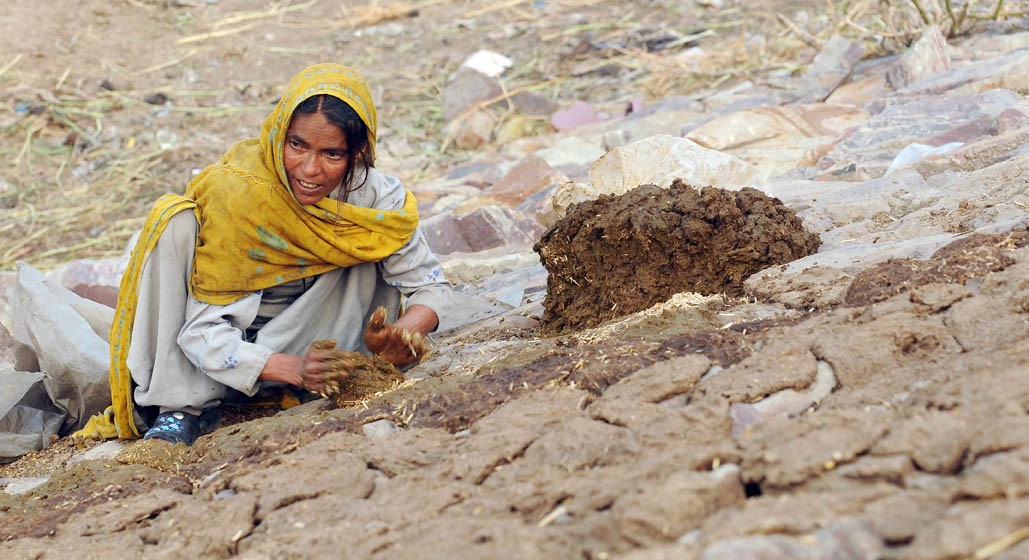
The poor residents of localities like Shahpur Kaanjran are without the basic amenities of life -- from lack of a hospital, a sewerage system, a school to a lack of ownership rights

It never rains here; it always pours, making the lives of hundreds of thousands miserable. The streets -- only a semblance of them -- are filled with marsh, making it hard for anyone to cross them. In the absence of a proper sewerage system, the poor people have no choice but to dig up gharkis (septic tanks) outside their houses where the sewage and water overspill can collect.
This is talking about scores of localities like Mahmood Booti and Shahpur Kaanjran that are to be found along the Bund Road (much of the Ring Road) and the river Ravi. The majority of people based in these localities are without the basic amenities of life. But they settled here because land was available at cheap rates thanks to it being ‘Shamlat’ - the properties left by the Hindus and Sikhs who migrated to India at the time of Partition.
A single gharki costs Rs20,000 (approx.) and is in working condition for 2-3 years only. After it fills up, it has to be covered with a slab and another gharki is to be dug.
The power supply is so low that the residents of these localities can sometimes not use fans or even bulbs in their homes. Obviously, they cannot use other electronic appliances either because they demand higher voltage.
What’s more, the localities are without a public school, a dispensary, a hospital and even a qualified doctor. On top of it, most people living in the area have no property ownership rights.
Muhammad Shafique, a resident of Akram Park, Peeran Colony, says, "We may be poor but we want our children to go to schools. For the purpose, we have to send them to suburbs such as Saanda, Outfall Road, Gulshan-e-Ravi and Kareem Park.
"Our children have to cross one of the busiest roads in Lahore twice a day on their way to and back from school. In the event of a medical emergency, there is no qualified doctor or hospital around the Ring Road to be found.
According to Shafique, "There are no pedestrian bridges [on the road] and accidents are a routine."
Shafique laments the fact that even though MNA Mehr Mushtaq (NA-121) and PMA Rana Mashhood (PP-149) would "often visit us before the 2013 elections, and they promised to work for the uplift of the area, we haven’t heard from them since.
"We are at the mercy of God. Every year, we are fear flash floods when India releases water into the river. We have to move most of our belongings to safer places."
"Sometime back, the government started laying Sui gas pipes in the area but the work was confined to a few streets," says Muhammad Jameel, an office-bearer of UC-84. "The contractor declared the area as a jungle and left the work unfinished."
It is learnt that these localities are home to multi-ethnic people. A lot of Afghans and Khyber-Pakhtunkhwa Pathans are also based here and they own a number of properties. Some houses are registered with the Board of Revenue. Most are not, and the residents have to pay only for the possession of land or house.
At present, the law and order is maintained but, till only last year, the locals had to form teams of volunteers to look after their houses and belongings at night because of a rise in incidents of robbery.
There are a number of factories and godowns also that store different items including dangerous chemicals. Kiosks and small shops have sprung up in different parts of the area.
Interestingly, the only ‘clinic’ found here is said to be run by a quack. Dawat-e-Islami recently began work on the construction of a mosque named Masjid Faizan-e-Bibi, close to the Peeran Colony graveyard.
The milkmen (mostly Gujjars) are another evil for the residents. These are a tough lot and exercise control over the streets where their buffalo compounds are located.
Though they supply milk to the city, the dung produced by their buffaloes spreads all over. At places, it collects in empty plots and remains there for months, becoming a breeding ground for mosquitoes.
"We can’t fight them [the Gujjars] as they are very powerful," says Tariq, father of four, who lives in a rented house.
"The political leaders promised to have our locality declared as Katchi Abadi, following which we would be able to acquire ownership rights. The entire Walled City was Shamlat but the people were eventually given ownership rights. Why are we being deprived?"
Tariq reveals that the locals "submitted 35 applications at different government offices last year. Our plight was also documented for a private TV channel but nothing came of it.
"The LDA does not count this area in its jurisdiction. Where do we go now?" he asks.